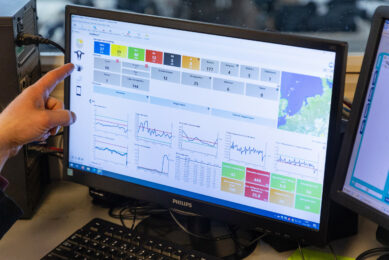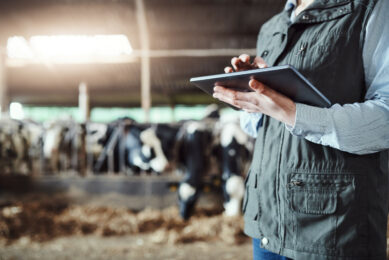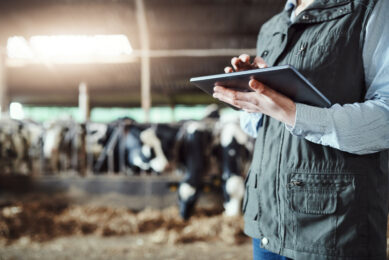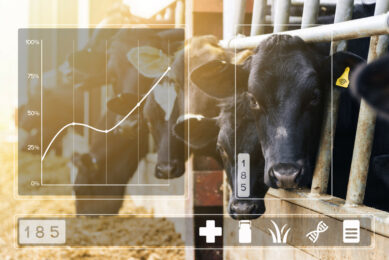New £1 mln project studies dairy cattle in living laboratory

A UK university is about to embark on a grand journey of discovery studying dairy cattle with a new state-of-the-art ‘living laboratory’. Dairy Global discusses the goals of the new project with Professor Richard Hammond, head of the Bristol Veterinary School.
A team of researchers at the Bristol Veterinary School, part of the University of Bristol, will help establish a new centre of research based at its Wyndhurst Farm thanks to the £1 million (€ 1.14 mln) donation from the John Oldacre Foundation. Known as the John Oldacre Centre for Sustainability and Welfare in Dairy Production, the centre will tackle the global challenge of ethical food security and train the next generation of vets and agriculturalists to help address the major issues facing agriculture. The university recognises that the world faces a huge problem of feeding an ever-expanding population with depleting agricultural resources. “At the current growth rate, by 2050 the equivalent of 4.5 additional planets will be needed to sustain everyone,” it said. “Livestock farming is part of the issue, but more importantly, part of the solution.”
ProfileProf Hammond is trained as a veterinary surgeon and joined the University of Bristol in 2013 as a Professor of Clinical Sciences and Deputy Head of School to support the implementation of the new curriculum and the management of the school. In 2016, he became Head of the University of Bristol’s School of Veterinary Sciences. Hammond is also Chief Executive of Langford Vets. |
Different disciplines brought together
Wyndhurst Farm is the University of Bristol’s commercially run dairy unit at Langford. Within it, the centre will be equipped with the latest data collection devices such as motion detection, GPS tracking and thermographic sensors to gather data that will identify and support changes in agricultural practices. The centre will bring together colleagues from engineering, data and behavioural sciences to use technology, such as motion sensing, to identify small behavioural and physiological changes at the beginning of a disease, such as mastitis. The school is already working with colleagues in life sciences, using thermography as a novel way of predicting disease, which can reveal, very quickly, which cow is ill. The earlier a disease can be detected, the easier it is to treat effectively. As well as being a research resource, the new centre will teach undergraduate and postgraduate students in animal production and livestock research, understanding and communicating data, and engagement with the wider farming community. In honour of the donation, the school will support postgraduate studentships each year that will benefit from the educational resource that the legacy will provide. This donation marks a long-standing and greatly valued partnership between the John Oldacre Foundation and the university. Since 2003, the Foundation has supported the Vet School and helped to make a positive impact on farming practice by improving our understanding of the causes of disease and welfare problems in dairy cattle, sheep, and pigs.

Dairy Global (DG): What is the current set up at Wyndhurst Farm in terms of dairy cow numbers, current research, current work, etc?
Richard Hammond (RH): “Wyndhurst Farm houses 200 cows and is used as a teaching facility for all years of Bristol’s Veterinary degree programme. Teaching ranges from meeting a cow for the first time, through learning about farm management from a veterinary perspective, through to working with our farm vets to do both fertility and animal treatment work. We have a range of current research projects, particularly focused on animal health and welfare including the relationship between immune response and behavioural changes, as potential predictors of disease; investigating ways of measuring emotional states in cattle, for example during cow calf separation; and developing novel methods for measuring pain in calves.”
DG: Why was this £1 million given to the Bristol Veterinary School? Are there links between the university and John Oldacre Centre?
RH: “The Vet School has a long relationship with the John Oldacre Foundation and they have funded several farm animal welfare related projects. These include investigations of digital dermatitis in cattle and more recently a project trying to better define and understand chronic lameness in dairy cattle.”
DG: What specifically will change at the dairy unit in terms of structure, new technology, cow numbers, etc?
RH: “The cow numbers will stay around the same but the infrastructure for handling data and recording data related to cattle will be new. The infrastructure for technology based research will allow the farm to be an early test bed for new technologies. For example, our data cabling and links to super computers will allow us to rapidly analyse huge quantities of real time data to develop earlier and more reliable predictors of disease. As new imaging technologies emerge, the farm will have the infrastructure and data handling capability to be a test bed for applying these technologies to agriculture. Just imagine new generations of cameras that accurately film in 3D and can automatically track individual animal movements throughout the facility.”
DG: How will results from the research with this new technology be used?
RH: “Some of the research will be early stage and will be shared with other researchers, through an open data platform, so they can, for example, adopt a technology we have proved in concept and test in a very applied setting. Other research will be applied and will be looking for ways to improve dairy management practices to make food production more efficient and improve veterinary health management of farm animals. The Bristol Veterinary School has a strong focus on animal welfare and behaviour, so we will always be focused on innovations that benefit the animals as well as agriculture and people.”
DG: When will the proposed centre be up and running?
RH: “The John Oldacre Centre for Sustainability and Welfare in Dairy Production will develop over time and will continually be updating with new innovations and technologies to ensure it is at the cutting-edge of research. We hope to have the core data handling capabilities to be in place by late summer this year.”
Join 13,000+ subscribers
Subscribe to our newsletter to stay updated about all the need-to-know content in the dairy sector, two times a week.










